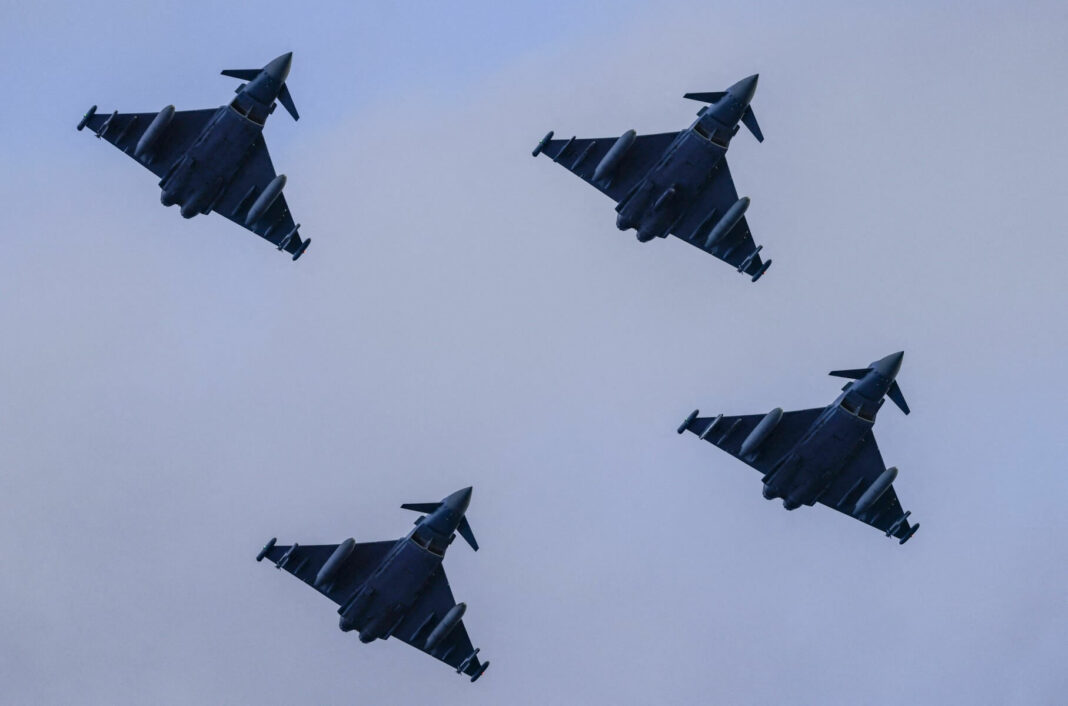Germany has reportedly blocked the delivery of some 30 Eurofighter Typhoon jets to Turkey following the arrest of İstanbul Mayor Ekrem İmamoğlu, a prominent opposition figure and potential challenger to President Recep Tayyip Erdoğan, the German Handelsblatt business daily reported on Thursday, citing sources familiar with the matter.
İmamoğlu, the opposition’s presidential candidate, was arrested on March 23 on corruption charges, which many critics view as politically motivated. His detention on March 19 ignited widespread protests, the largest in Turkey since 2013, escalating political tensions.
His arrest also drew international condemnation, with the German government calling it an “attack on Turkish democracy.”
Germany’s move halts Turkey’s broader plan to acquire 40 Eurofighter Typhoons, 20 Tranche 1 jets from the UK and 20 advanced Tranche 4 models, to modernize its air force. The Eurofighter is a joint project by Germany, the UK, Italy and Spain, requiring all partners’ approval for exports.
German Chancellor Olaf Scholz had reportedly made headway in secret talks with Erdoğan to greenlight the deal before İmamoğlu’s arrest derailed the process. Speaking from prison, İmamoğlu has urged his supporters to continue advocating for democracy.
Germany’s government declined to comment on the report. “As a matter of principle, we do not comment on internal government discussions,” a spokesperson told Agence France-Presse on Friday.
The timing is especially sensitive. Turkey, NATO’s second-largest military power, plays a critical role in the alliance’s southeastern flank amid rising tensions in the Middle East and with Russia.
Analysts warn that blocking the sale could hamper Turkey’s defense capabilities and further strain NATO unity. Ankara has also pursued alternatives, including the US-made F-35 and its domestically developed Kaan jet, which completed its maiden flight in 2024.
The issue reveals long-standing tensions within the Eurofighter consortium. Germany’s restrictive stance on arms exports has frequently clashed with the interests of its partners. Efforts to align EU-wide arms export policies remain stalled.
The political backdrop in Germany is also shifting. The ruling Social Democrats (SPD) and Greens are operating as a caretaker government after their coalition with the Free Democrats collapsed last year. In February elections, the Christian Democratic Union/Christian Social Union (CDU/CSU) bloc emerged as the largest party and recently finalized a coalition agreement with the SPD. Their platform includes a pledge to streamline arms export approvals and better coordinate within European defense frameworks.
While the CDU/CSU supports the Eurofighter sale, the SPD remains opposed. CDU leader Friedrich Merz reportedly plans to use the deal as leverage in discussions with Erdoğan, potentially linking progress on the jet sale to İmamoğlu’s release.
Turkey’s defense ministry is currently reviewing a British proposal for the Tranche 1 jets, submitted in March. The UK has approved the sale, and negotiations are ongoing. The Turkish Air Force aims to deploy all 40 Typhoons by 2030.
Meanwhile, Turkey remains excluded from the US F-35 program after purchasing Russian S-400 air defense systems, a decision that led Washington to ban the sale of F-35s to Ankara. US media reports suggest a potential shift following the return of Donald Trump to the presidency, although Turkey has shown no signs of relinquishing the S-400s.
Germany has floated the European Sky Shield Initiative (ESSI), a joint missile defense project including Turkey and Greece, as a possible solution. It could offer Ankara US-made Patriot systems as replacements for the S-400s. Turkey has also proposed including its domestically produced air defense systems in the initiative.
Despite political strains, Turkey remains a major customer of German defense contractors. Preliminary 2024 data show nearly €231 million in arms sales, including torpedoes, guided missiles and submarine parts, making Turkey Germany’s fifth-largest arms buyer. Between 2020 and 2024, Germany ranked as Turkey’s third-largest arms supplier after Spain and Italy.


